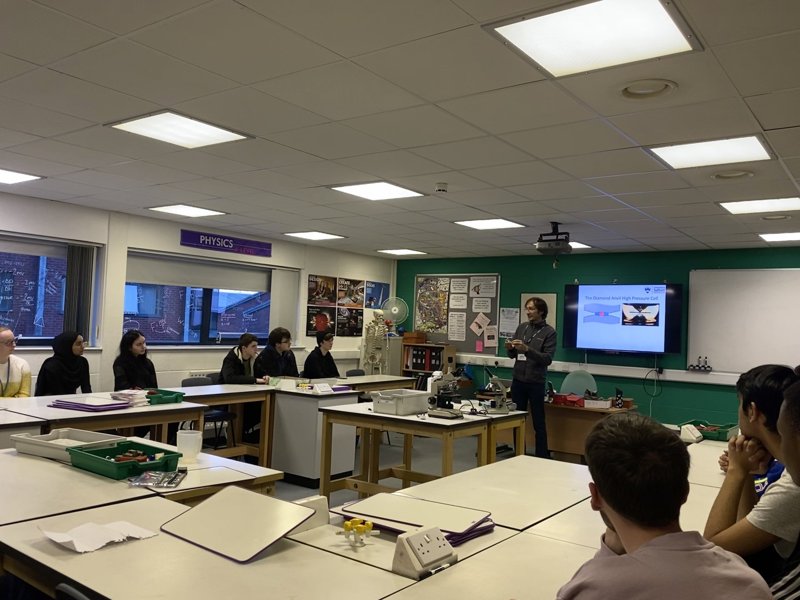Materials and Physics
Welcome to the website of the Materials and Physics research group!
Research areas
You can read more about our current research areas below:
• Functional chemical vapour deposition
• Nonlinear photonics and materials
• Liquids and supercritical fluids
Postgraduate study
Available courses
The following postgraduate research degree courses are available:
Doctor of Philosophy (Ph.D.) 3 years full time / 5 years part time. Assessment is by submission of a thesis and an oral viva, conducted by an internal and external examiner, as well as an independent chair.
Master of Research (M.Res.) and Master of Philosophy (M.Phil.) 1 year full time / 2 years part time. Assessment is by submission of a thesis, which will be scrutinized by an internal and external examiner. An oral viva may be held, at the discretion of the examiners. Both these courses are masters-level qualifications (level 7). The M.Phil. is a slightly higher qualification, with a longer word limit for the thesis (50,000 words as opposed to 40,000).
Fees and funding
Information on tuition fees at the University of Salford can be found here. It may also be necessary to pay bench fees, or apply to the university’s postgraduate research small project fund, to purchase laboratory consumables and equipment for your work. Please discuss this with your prospective supervisor before making your application.
There are various funding options that you may be able to apply for: University of Salford donor-funded scholarships and bursaries, University of Salford international scholarships, Institute of Physics scholarships, British Council international scholarships.
How do I apply?
Applications can be accepted for start dates in January, April, July and October. If you would like to apply have a look at our research areas and projects listed above, and decide what interests you. If you have your own idea for a project that is not obviously related to the research areas above, we may still be able to accept your application! Get in touch (j.e.proctor@salford.ac.uk) with a brief description of what you want to do, and I will put you in touch with any staff who are able to supervise your project. You can then discuss with your prospective supervisor what course you want to do, and whether the course (duration of study) is appropriate for the proposed project. Once you have made a final decision what you would like to apply for, you can apply online here. We are also able to co-supervise students with academic staff in chemistry, acoustics, health and life sciences where appropriate.
Facilities
We are equipped with a range of facilities for modern materials physics research, the principal laboratories are listed below.
Salford analytical services (electron microscopy, NMR, lab XRD)
Recent publications
Group publications January 2023 to date:
- J.E. Proctor, C.E.A. Robertson, L.J. Jones, J. Phillips, K. Watson, Y. Dabburi and B. Moss, All-optical method to directly measure the pressure-volume-temperature equation of state of fluids in the diamond anvil cell, Physics of Fluids (accepted) (2024). https://arxiv.org/abs/2407.07935
- J.E. Proctor and K. Trachenko, Generally applicable physics-based equation of state for liquids, Reports on Progress in Physics (accepted) (2024). https://doi.org/10.1088/1361-6633/ad6a80
- K. Huo, R. Yang, H. Jia, Y. He and J.M. Christian, Exact similariton solution families and diverse composite waves in coherently coupled inhomogeneous systems, Nonlinear Dynamics 111, 14435 (2023). https://doi.org/10.1007/s11071-023-08574-9
- J.E. Proctor, C.G. Pruteanu, B. Moss, M.A. Kuzovnikov, G.J. Ackland, C.W. Monk and S. Anzellini, A comparison of different Fourier transform procedures for analysis of diffraction data from noble gas fluids, J. Appl. Phys. 134, 114701 (2023). https://doi.org/10.1063/5.0161033
- M. Burkitt-Gray, M. Casavola, P.C.J. Clark, S.M. Fairclough, W.R. Flavell, R.A. Fleck, S.J. Haigh, J. Chun-Ren Ke, M. Leontiadou et al., Structural investigations into colour-tuneable fluorescent InZnP-based quantum dots from zinc carboxylate and aminophosphine precursors, Nanoscale 15, 1763 (2023). https://doi.org/10.1039/D2NR02803D
- K. Huo, R. Yang, H. Jia, Y. He and J.M. Christian, Exact similariton solution families and diverse composite waves in coherently coupled inhomogeneous systems, Nonlinear dynamics (2023). https://doi.org/10.1007/s11071-023-08574-9
- J.E. Proctor and H.T. Gould, Derivation of the field due to a magnetic dipole without use of the vector potential, The Physics Teacher 61, 40 (2023). https://doi.org/10.1119/5.0077127
Our participation in Athena Swan and Juno
The Athena Swan Charter is a programme established by Advance HE (formerly the Higher Education Academy) to advance gender equality within higher education and research. We are part of the University of Salford School of Science, Engineering & Environment, which holds the Athena Swan Bronze award. We have also been awarded Practitioner status in the UK Institute of Physics Project Juno, working to address gender equality in physics.


Outreach
We are available for a wide range of outreach activities, both face-to-face and online, and are experienced at school visits, evening lectures, science festivals etc. In the laboratory, we have practical demonstrations such as measuring the speed of light, viewing materials at high pressure inside a diamond anvil cell, that are portable and can be taken to your science festival, sixth form college or wherever. So, if you are interested in working with us on any public engagement / outreach activity please get in touch at j.e.proctor@salford.ac.uk.
